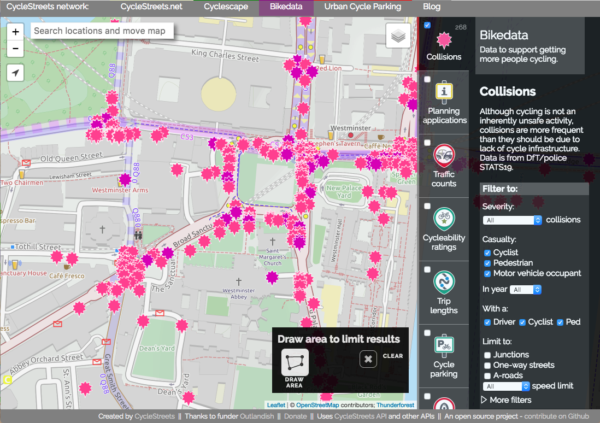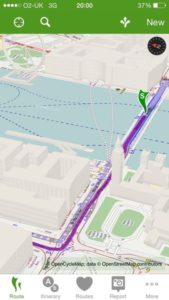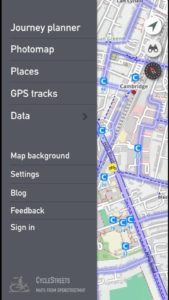
CycleStreets: Powering cyclists with OpenStreetMap
CycleStreets is a social enterprise, promoting cycling by the provision of UK-wide information on cycle-friendly routes, and various tools for cycle advocacy groups. CycleStreets is one of the earliest high-profile users of OpenStreetMap, launching in 2009.
CycleStreets runs three main websites, all making significant use of OSM: a journey planner at cyclestreets.net for A-B routing, Cyclescape, a toolkit for campaign groups, and Bikedata. They run OSM training sessions for Local Authorities, and have created a Community mapping guide.
CycleStreets journey planner

The journey planner, for which CycleStreets is best known, aims to provide the world’s best cycle routing – for ordinary A-B utility journeys. Although predominantly a UK site, the routing covers most of northern Europe, as well as many major cities around the world.
As well as our website and free apps on all current app platforms, our routing is used in a wide range of third-party products. These include Citymapper (a very popular app providing multimodal routing), Bike Hub, various London cycle hire apps, ViewRanger, and more. Routing is also used by various transport companies (e.g. Virgin Trains East Coast, SDG, Placr Transport API, Traveline Wales/Scotland), as well as in projects such as the DfT funded Propensity to Cycle Tool.
A range of route types are offered: a fastest route, a quieter route (for those less confident in traffic), and a balanced route – the default – which aims to provide a practical route suitable for most people. Additionally, a leisure routing mode gives circular routes according to a specified time or distance.
“Our work is only possible thanks to the power of OpenStreetMap. We import and process OSM data to turn it into a versatile API, which we and third parties use to create useful services that help to increase levels of cycling and improve safety.”
— Simon and Martin
 The results are underpinned by extensive analysis of OSM data. Routing takes into account road/street type, hills and inclines, cycle infrastructure, path widths/quality, barriers and obstructions, land ownership, surface quality, route legibility, national/local signed routes, lighting and turn delays. Even turn delays are modelled in detail, taking into account road type, type of turn, and delays from loss of momentum and caution.
The results are underpinned by extensive analysis of OSM data. Routing takes into account road/street type, hills and inclines, cycle infrastructure, path widths/quality, barriers and obstructions, land ownership, surface quality, route legibility, national/local signed routes, lighting and turn delays. Even turn delays are modelled in detail, taking into account road type, type of turn, and delays from loss of momentum and caution.
CycleStreets’ routing engine is a custom engine developed since 2009 with advanced features that other engines are only starting to support. At a technical level, the engine, written in C++, supports multiple routing types, rule-based turn delays, relation and virtual relation support, a cellular optimisation compression technique, multiple elevation sources, and more.
Most importantly, scorings are based not just on basic OSM highway classifications but also hundreds of rules which make fine-grained adjustments based on detailed OSM attributes.
Tools for cycling advocacy
CycleStreets’ work also includes extensive work on creating tools for cycling advocacy. Cyclescape is a facility to provide cycle campaign groups around the UK and their members with a toolkit for easy discussion and resolution of campaigning issues, whilst Bikedata, is a ‘one-stop shop’ for data that helps them in this work. OSM maps are used throughout, and some of the software used to build the site has come about thanks to the OSM ecosystem.
CycleStreets services
CycleStreets offers a wide range of services in cycle journey planning, advocacy tools, and promotion of cycling. This work was recognised in the Cycle Planning Awards, winning Best Innovation category 2016.
The API, containing over 25 calls covering both journey planning and cycling data, powers the website and third-party systems. The API standardises on GeoJSON, to enable easy integration by developers. API keys are available free, though access is also available under an SLA for volume requirements or commercial users needing an uptime guarantee.
CycleStreets also builds sites for third parties. These include hosted white-label sites for clients such as Halfords and local authorities, and portals like Urban Cycle Parking for TfL.
Much of our code is on Github, and as a not-for-profit social enterprise, we welcome contributions of code, design, finance, and ideas.
